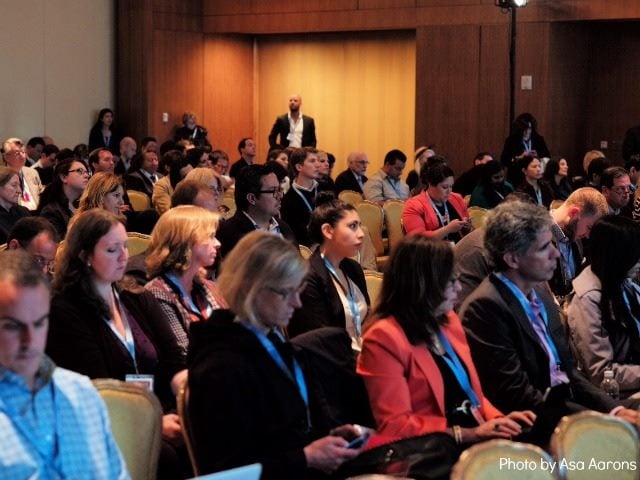If you're still dragging your feet on digital technologies, it's time to stop. As Newcastle Beer brand director Quinn Kilbury said yesterday, "Everything you do has to be about digital. In fact, 100 percent of our marketing budget goes to digital."
Kilbury was one of more than two dozen speakers who took the stage at the all day Westchester Digital Summit in metro New York City. Held at the Ritz-Carlton in White Plains, N.Y., the event brought several hundred senior marketing professionals together to brainstorm the best ways to create a strong social and digital presence.
From building your brand's online reputation to capitalizing on social media to connect with everyone from customers to competitors, marketers have more options than ever before. And while that may be intimidating, it's also a fact of life — and any company that fails to embrace it is doomed to fail, the speakers consistently warned.
Reinventing Marketing
Organized by social media consultancy Silverback Social, the conference included keynotes from Gary Vaynerchuk and David Kidder, author of the "The Startup Playbook: Secrets of the Fastest-Growing Startups," from Their Founding Entrepreneurs.
It also included a steady stream of conversation with heavy hitters from companies like Facebook, LinkedIn, Huffington Post, RebelMouse, Omnigon Communications, MasterCard, General Electric, ESPN, Fox Sports, IBM, TerraMar Project and Influence & Co.
Vaynerchuk, cofounder and CEO of a social media brand consulting agency VaynerMedia, told the crowd that it is essential to embrace innovation and recognize disruption, even in terms of the everyday ways business is conducted. "How many people in the room actually get mad when someone calls them?" he asked — to a quick rise of hands from about a third of the attendees.
Vaynerchuk said marketing used to be a game of width, measured by things like ad impressions. Now it's a game of depth, he explained. "Brands are in a battle for attention," he explained, so they need focus on depth rather than width to make their marketing count and engage prospective customers.
Remember 15 years ago when we all liked email? We live in a world where we interrupt people to tell them our value, he continued. But customers have less and less tolerance for irrelevant interruptions. You have to give them something of value to make yourself more than an annoyance.
As Kidder noted during the morning keynote, "The companies and the people who win today think disproportionately about the value they will create for their customers."
It's tricky, he conceded, and being an entrepreneur today is "stupidly hard." But the companies who succeed take risks. "Playing not to lose is, statistically, a really bad strategy," he added.
Navigating the Digital Landscape
Speaker after speaker reiterated what marketers have increasingly discovered. Innovation matters — and real innovation means much more than adopting the latest technologies. Kilbury, for instance, talked about the traction Newcastle Brown Ale gained from its Super Bowl ambush marketing campaign.
While competitors like Bud Light spent millions on celebrity filled Super Bowl ads featuring Arnold Schwarzenegger, Don Cheadle and a llama, Newcastle — brewed by Heineken at the John Smith's Brewery in Tadcaster, North Yorkshire, England — arguably got more attention for marketing at a fraction of the cost.
It spent days running over the top teaser ads as part of a digitally focused campaign designed to poke fun at Super Bowl advertising. As one of Newcastle's teaser ads noted: "It is the mega huge football game ad" the brand "could have made if we had the money, talent and permission to advertise in the game."
Kilbury described the effort as wildly successful — and noted that it proved what many marketers need to know and understand. "Everything you do has to be about digital," he said, adding that 100 percent of Newcastle marketing budget is allocated to online and mobile marketing.
Gabe Goodwin, coordinating producer of Social Production for ESPN, noted that brands should take advantage of second screens. They keep users from losing interest — and tie them to your brand long after an event they may see live or on television ends.
Accept Reality

